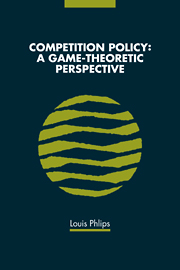13 - Antitrust implications
Published online by Cambridge University Press: 23 September 2009
Summary
As shown in chapter 11, recent game theory is able to demonstrate that predatory pricing can be rationalised in an intertemporal profit maximisation approach, when a number of conditions are met. The essential conditions are that the predator be a multimarket firm, otherwise McGee's (1980) objections apply, and that his pricing behaviour can be misinterpreted by an entrant as normal competition. Although the first is easy to recognise in practice, the second implies that identification of predatory behaviour is a fortiori inherently difficult for both the economist and the antitrust authority. Yet, difficult to identify or not, predatory pricing is a real possibility.
Chapter 12 suggests that clearly identified cases of predatory pricing are hard to find. In the vast majority of cases, alleged predation is doubtful predation, which should not come as a surprise given that true predation requires the presence of such doubts. For the very same reason, predatory pricing may be more frequent, in the real world, than is generally thought.
Even if it were in fact rare, antitrust authorities could not simply disregard it. Indeed, to preserve free entry is one of the main objectives of any antitrust policy. When there is room in a market for new entrants (their entry value is positive under normal competition), predation should not be allowed to make this entry value negative and thus to discourage or delay further entry (or, in the limit, force exit). The issue is an essential one.
- Type
- Chapter
- Information
- Competition PolicyA Game-Theoretic Perspective, pp. 230 - 255Publisher: Cambridge University PressPrint publication year: 1995



